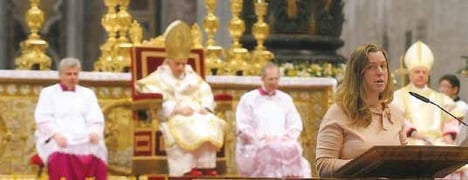
In January, faculty member Dr. Marie Nuar returned from Rome to begin working at CDU full time as faculty chair, a role that combines teaching and administrative responsibilities. Dr. Nuar has spent over 11 years overseas, living mostly in Rome and Cairo and Old City Jerusalem. She holds a doctorate in Ecumenism and Interreligious Dialogue from the Pontifical University of St. Thomas in Rome, an MA in Theology and Christian Ministry from Franciscan University of Steubenville, an MA in Jewish Studies from the Pontifical Gregorian University in Rome, and an STL in Missiology from the Pontifical Gregorian University in Rome. Dr. Nuar also has a license in Arabic and Islamic Studies from the Pontifical Institute for Arabic and Islamic Studies in Rome and is proficient in Arabic.
“I really like the interaction and sharing what I have learned with students. To me, learning information without sharing it is like a lake that has an inflow but no outflow. It becomes stagnant and in the extreme, dead, like the Dead Sea,”
Dr. Nuar taught as an adjunct professor of theology at St. John’s University, Rome campus and as an adjunct professor for The Catholic University of America’s Rome campus. She also enjoyed working as a guide for the excavations beneath St. Peter’s Basilica. With expertise in Judaism, Islam and Christianity, she says, “the details can make a large difference. For instance, all three religions would posit that the world and humans are created by a benevolent God, that there are objective standards that he puts forth for what is right and wrong, that human beings have freedom to follow these standards or not, but that they will be judged accordingly.”
“The difference lies in Christianity’s belief in the Incarnation,” she explains. “’The only-begotten Son of God, wanting to make us sharers in his divinity, assumed our nature, so that He, made man, might make men gods” (St. Thomas Aquinas, Opusc. 57, 1-4.) She adds, “And that makes all the difference.”







